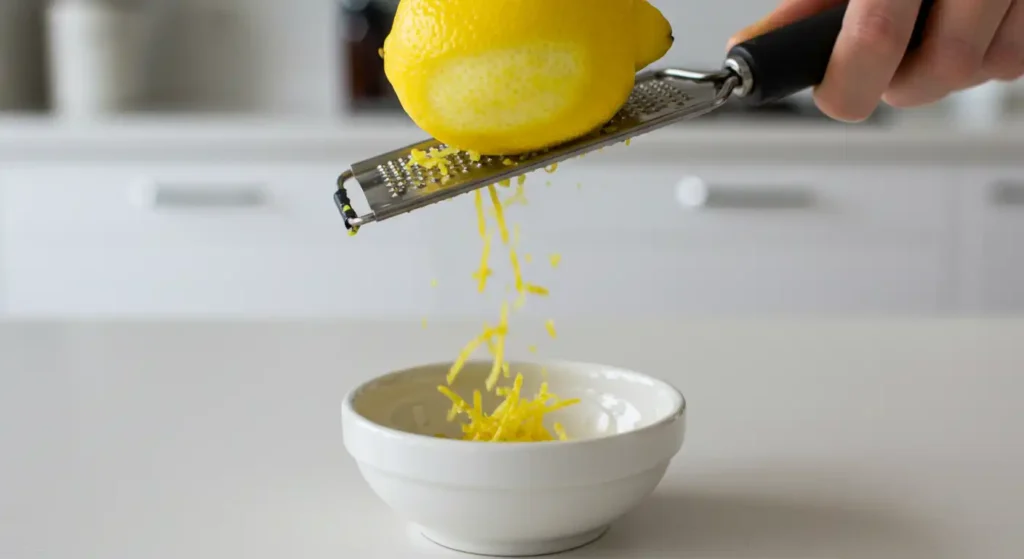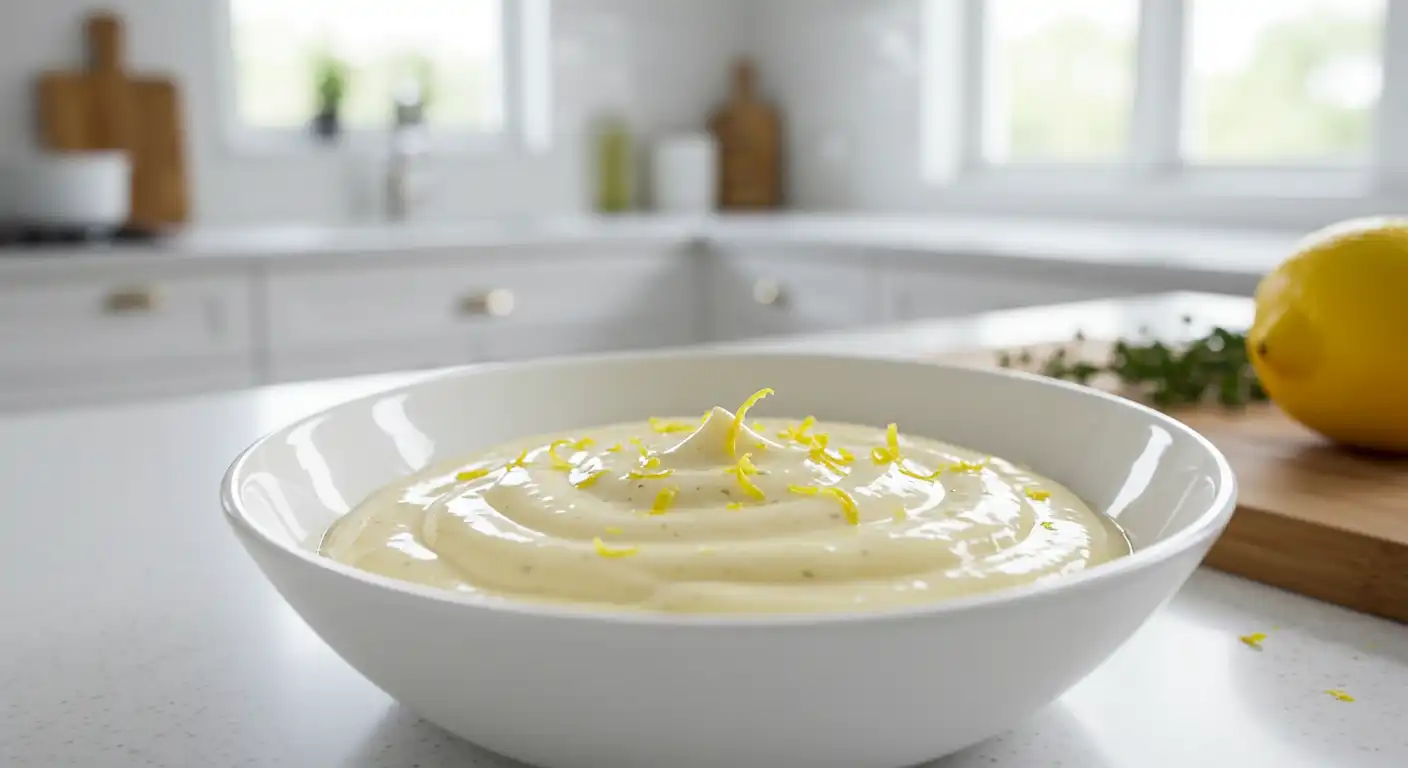What is lemon pepper sauce made of? Lemon pepper sauce is a tangy, buttery condiment that has taken the culinary world by storm. Defined by its signature blend of lemon juice, lemon zest, black pepper, and creamy butter, this flavorful sauce is revered for its versatility and brightness. Whether drizzled over fish, tossed with pasta, or used as a dipping sauce, lemon pepper sauce provides a burst of citrusy goodness that complements a wide variety of dishes.
In this article, you’ll learn about the history of lemon pepper seasoning, discover what goes into making a classic lemon pepper sauce, and gain insights into different variations and serving ideas. We’ll cover everything from the best way to zest a lemon to how to store your sauce for maximum freshness. By the end, you’ll be fully equipped to whip up and customize this zesty sauce for all your culinary adventures.
A Brief History of Lemon Pepper Seasoning
Before we delve into the sauce itself, it’s helpful to understand the background of its key flavoring: lemon pepper seasoning. While it may seem like a modern grocery-store staple, lemon and pepper have a long-standing culinary history that stretches back centuries. Traditional Mediterranean dishes often utilize bright citrus flavors, especially lemon, to counterbalance the richness of meats like lamb or seafood. Meanwhile, black pepper has been prized throughout history for its pungency and mild heat, trading at times as a highly valuable commodity.
The combination of lemon and pepper has become a beloved classic worldwide. Over time, dried lemon zest and ground pepper were mixed with salt and occasionally other herbs or spices, resulting in the lemon pepper seasoning we know today. This seasoning blend grew in popularity during the mid-20th century, when premade spice mixes became more prevalent in home kitchens.
With the seasoning’s success, inventive home cooks and professional chefs alike sought to incorporate it into sauces—and thus, lemon pepper sauce was born. By adding butter (or another base) to lemon pepper seasoning, people created a tangy, peppery sauce that is easy to prepare and delicious on everything from chicken wings to pasta. This sauce, in turn, inspired numerous spinoffs, each with its own twist and flair.
Key Components of Lemon Pepper Sauce
Butter: The Creamy Base
One of the main reasons lemon pepper sauce is so universally appealing is the use of butter as its foundation. Butter provides a rich, creamy texture that balances the tartness of lemon. You can choose salted or unsalted butter, but many cooks prefer unsalted so they can better control the overall salt level of the sauce.
Lemon Zest and Juice: The Citrus Punch
At the heart of lemon pepper sauce is, naturally, lemon in two forms:
- Lemon zest, which is the grated outer peel of the lemon. Zest contains aromatic oils that give a burst of fresh, floral citrus flavor.
- Lemon juice, which adds a tangy acidity and brightens the dish.
Using fresh lemons is key. The flavor from bottled lemon juice or pre-packaged zest can’t compete with the zippy fragrance and natural oils found in fresh citrus.
Black Pepper or Lemon Pepper Seasoning: The Zesty Kick
The sauce typically includes cracked black pepper for heat, or a lemon pepper seasoning blend that integrates pepper, dried lemon peel, salt, and sometimes garlic or onion powder. If you opt for straight black pepper, consider adding a pinch of salt (if not using salted butter) to round out the flavors. When using a commercial lemon pepper seasoning, be mindful of its sodium content—taste as you go and adjust accordingly.
Garlic and Other Flavor Boosters
Many recipes call for garlic powder or fresh minced garlic, which adds depth and savory notes to the sauce. Beyond garlic, you might also see additions like honey for sweetness, onion powder for extra savoriness, or chili flakes for heat. Ultimately, the specific seasonings you include will determine the final flavor profile, so feel free to experiment.
Why Lemon Pepper Sauce Is So Popular
Lemon pepper sauce enjoys enduring popularity for several reasons:
- Versatility: It works across different proteins, vegetables, and grains.
- Accessibility: The ingredients (lemon, butter, pepper) are easy to find and typically budget-friendly.
- Speed and Simplicity: You can make a batch of lemon pepper sauce in under 15 minutes, making it ideal for busy weeknights or quick lunches.
- Customizability: You can add or substitute ingredients (like fresh herbs or heat elements) to tailor the sauce to your preferences.
- Balanced Flavor: The tartness of lemon, the mild spice of black pepper, and the creaminess of butter create a harmonious trio that pleases most palates.
Classic Lemon Pepper Sauce Recipe
Below is a go-to recipe for making a robust lemon pepper sauce. While the recipe is simple, it’s extremely adaptable. Keep reading for ideas on spicing it up or making it creamier.
Ingredients List
- Butter (unsalted): ½ cup (1 stick), melted
- Lemon zest: 2 teaspoons (from fresh lemons)
- Lemon juice: 2 tablespoons (freshly squeezed)
- Lemon pepper seasoning: 1 tablespoon (or 1 teaspoon cracked black pepper + 1 teaspoon salt)
- Garlic powder: 1 teaspoon (or 1 clove fresh garlic, minced)
- Honey (optional): 1 teaspoon (adds a subtle sweetness)
- Additional salt: to taste (if needed)
- Additional black pepper: to taste (for a spicier kick)
Step-by-Step Instructions
- Melt the Butter
In a small saucepan, melt the butter over low heat. Avoid scorching by keeping the flame gentle. - Add Lemon Elements
Once melted, stir in the lemon zest and lemon juice. The zest provides an intensely bright flavor, while the juice contributes tanginess. - Season
Add the lemon pepper seasoning (or black pepper + salt) and garlic powder. Stir to combine thoroughly. - Taste and Adjust
Sample the sauce. If you prefer a sweeter balance, mix in the optional honey. If you like more lemon flavor, add another teaspoon of lemon juice. For extra spice, add more cracked black pepper. - Simmer Briefly
Let the sauce simmer on low heat for 2–3 minutes, stirring to avoid scorching. This allows all the flavors to meld. - Serve or Store
Use immediately or transfer to an airtight container and store in the refrigerator for up to 5 days.

Pro Tips and Adjustments
- Use fresh garlic if you prefer a more pronounced garlicky taste—just sauté it in the butter before adding the lemon juice.
- Control the salt: If your lemon pepper seasoning is already salty, you may not need to add extra salt.
- Double the Batch: If you love lemon pepper sauce, making extra can save you time later. Freeze it in ice cube trays for future single-serving uses.
Variations and Flavor Twists
While the classic lemon pepper sauce is often enough to satisfy, there are countless ways to alter the recipe to match your taste.
Creamy Lemon Pepper Sauce
For a richer mouthfeel and a hint of sweetness, stir in a splash of heavy cream, half-and-half, or Greek yogurt at the end. This variation pairs wonderfully with seafood and pasta, giving your dishes a luxurious, velvety texture.
Spicy Lemon Pepper Sauce
If you crave heat, add a teaspoon of red pepper flakes, a dash of hot sauce, or finely diced fresh chili peppers. The bright, spicy notes will contrast with the citrus, creating a more adventurous flavor profile.
Lemon Pepper Sauce with Fresh Herbs
Experiment with fresh herbs like thyme, rosemary, or basil. Finely chop the herbs and add them toward the end of cooking so they retain their vibrant color and fragrant taste. This twist can complement grilled chicken, roasted veggies, or homemade focaccia.
How to Zest and Juice Lemons Properly
Because the lemony tang in lemon pepper sauce relies so heavily on the quality of your lemons, it’s essential to learn the proper techniques for zesting and juicing.
Tools for Zesting
- Microplane grater: The most popular tool, yielding fine, fluffy zest.
- Zester: Specifically designed for collecting thin strips of zest.
- Vegetable peeler: Can work in a pinch, though you’ll need to chop or mince the peel afterward to avoid large pieces.
Techniques for Optimal Flavor
- Wash and Dry: Always rinse your lemons well (especially if they are not organic) and pat them dry.
- Avoid the Pith: The white layer beneath the yellow peel is bitter. Grate or shave only the yellow surface.
- Collect Directly: Zest directly over your bowl or saucepan to capture the flavorful citrus oils released as you grate.
- Juice Smart: Roll the lemons on a countertop before cutting to make them juicier. A citrus juicer or reamer helps extract more juice with less effort.
Nutritional Information
Below is a general approximation of the nutritional content in one tablespoon of a classic lemon pepper sauce (based on the ingredients listed above):
| Nutrient | Per Tablespoon |
|---|---|
| Calories | 50 |
| Fat | 6g |
| Carbohydrates | 1g |
| Protein | 0g |
| Sodium | 70mg (approx.) |
Keep in mind that modifications—like using salted vs. unsalted butter, adding cream, or increasing the spice—will change these values slightly. If you are watching your salt or fat intake, consider using less butter, opting for a low-salt lemon pepper blend, or adjusting your portion sizes.
Top Ways to Use Lemon Pepper Sauce
Because lemon pepper sauce is so adaptable, there’s hardly a dish it can’t improve. Here are some popular (and delicious) ways to incorporate it into your everyday cooking:
Lemon Pepper Wings
- Marinate or toss: Cook your wings (baked, fried, or air-fried) until crispy. Then, coat them in warm lemon pepper sauce.
- Garnish: Add chopped fresh parsley or cilantro for color and herbal brightness.
- Serve: Pair with crunchy celery and carrot sticks. Add ranch or blue cheese on the side for dipping.
Seafood: Salmon, Shrimp, and More
- Salmon: Drizzle or brush lemon pepper sauce over salmon fillets before baking or grilling. The tangy sauce cuts through the richness of the fish.
- Shrimp: Sauté shrimp in lemon pepper sauce for a quick dinner that pairs beautifully with rice or pasta.
- Scallops: Pan-sear scallops in butter, then add lemon pepper sauce at the end for a citrusy glaze.
Pasta: A Quick, Zesty Meal
- Creamy or Non-Creamy: You can use the classic sauce or a cream-enhanced version.
- Add Protein: Mix in grilled chicken or shrimp for a satisfying main dish.
- Fresh Elements: Toss in spinach, cherry tomatoes, or roasted veggies for added nutrition and texture.
Vegetables and Sides
- Roasted Veggies: Toss broccoli, asparagus, or zucchini in lemon pepper sauce after roasting.
- Rice or Quinoa: Stir a spoonful of sauce into cooked rice or quinoa for an instant upgrade.
- Potatoes: Brush lemon pepper sauce on baked potatoes or roasted new potatoes for a tangy spin.
Dips and Dressings
- Dipping Sauce: Serve lemon pepper sauce alongside breadsticks, chicken tenders, or grilled veggies.
- Salad Dressing: Thin the sauce with olive oil or vinegar to create a citrusy salad dressing.
- Sandwich Spread: Mix a bit of mayonnaise with lemon pepper sauce to create a zesty spread for sandwiches or wraps.
Storage and Shelf Life
Lemon pepper sauce is best when fresh, but it can be stored for convenience:
- Refrigeration: Place leftover sauce in an airtight container or jar. It should stay fresh for up to 5 days in the refrigerator.
- Freezing: Freeze your sauce in an ice cube tray. Once frozen, transfer the cubes to a freezer-safe bag or container. Stored this way, the sauce can last up to 3 months.
- Reheating: Gently warm the sauce in a saucepan over low heat. Stir frequently to maintain a smooth texture and prevent the butter from separating or burning.
Frequently Asked Questions: What is lemon pepper sauce made of?
Q: Are lemon pepper wings dry or wet?
A: They can be both! Dry lemon pepper wings rely on seasoning alone, while wet wings are coated in lemon pepper sauce for extra tang.
Q: What is the secret ingredient to crispy wings?
A: A dash of baking powder on the chicken skin helps it become crispy when baked or fried.
Tips for Success
- Taste as you go: This helps you achieve the right balance of tanginess, saltiness, and spice.
- Invest in quality ingredients: Since the sauce has few components, using high-quality butter and fresh lemons makes a noticeable difference.
- Don’t boil vigorously: Keep the heat low to avoid curdling the lemon juice or burning the butter. A gentle simmer is all you need.
- Try different peppers: Instead of traditional black pepper, experiment with white pepper, pink peppercorns, or a coarsely ground pepper medley for new flavors.

Other Delicious Sauces to Explore
Once you’ve mastered lemon pepper sauce, consider exploring additional sauces to broaden your culinary repertoire:
- Tzatziki Sauce
- Key Ingredients: Greek yogurt, cucumbers, garlic, and dill.
- Flavor Profile: Cool, refreshing, slightly tangy.
- Best Uses: Serve with grilled meats, pita bread, or fresh vegetables.
- Garlic Butter Sauce
- Key Ingredients: Butter, garlic, herbs (parsley or basil).
- Flavor Profile: Rich, savory, and aromatic.
- Best Uses: Perfect drizzled over steak, fish, or roasted vegetables.
- Pizza Sauce
- Key Ingredients: Tomato puree, garlic, onions, Italian herbs.
- Flavor Profile: Tomato-forward, herby, slightly sweet.
- Best Uses: Use as a base for homemade pizza, calzones, or as a dipping sauce.
- Chimichurri
- Key Ingredients: Fresh parsley, oregano, garlic, vinegar, olive oil.
- Flavor Profile: Herbaceous, tangy, slightly spicy (if you add chili).
- Best Uses: Ideal for grilled steak, chicken, or roasted vegetables.
- Hollandaise
- Key Ingredients: Egg yolks, butter, lemon juice, cayenne pepper.
- Flavor Profile: Creamy, buttery, and mildly tangy.
- Best Uses: Classic for Eggs Benedict, asparagus, and fish dishes.
Each sauce has a distinct personality, much like lemon pepper sauce. Learning how to make these staples can significantly boost your cooking confidence and help you create diverse, restaurant-quality meals at home.
Conclusion
From humble kitchen staple to gourmet finishing sauce, lemon pepper sauce has proven its versatility and crowd-pleasing appeal time and time again. Comprised of butter, lemon zest, lemon juice, and pepper, this sauce excels in offering a balanced, bright flavor that complements everything from chicken wings to pasta, vegetables, and beyond.
A Quick Sauce Joke to Brighten Your Day
Q: Why don’t sauces ever get into arguments?
A: Because they always blend in harmony!
Enjoy Your Homemade Lemon Pepper Sauce!
Whether you’re whipping up tangy lemon pepper wings or brightening up a seafood dish, this quick sauce adds a burst of citrusy flavor to all your meals. Experiment, have fun, and savor every zesty bite!
